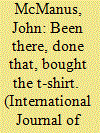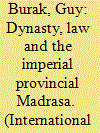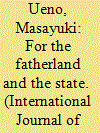|
|
|
Sort Order |
|
|
|
Items / Page
|
|
|
|
|
|
|
| Srl | Item |
| 1 |
ID:
120064


|
|
|
|
|
| Publication |
2013.
|
| Summary/Abstract |
In this article, I explore how the rapid commercialism and commodification of Turkish premier league football has affected the activities of a particular fan group, Çarsi, for the club Besiktas, one of Turkey's oldest teams. I look at how elements of the commodification of football have been harnessed and mediated by Çarsi to make ethical and political statements and convey an anarcho-socialist message. These processes, I argue, are driven by the possibilities opened up by rapid social and technological development. The shift to searching for identity among the forums and video websites of the internet, rather than on the terraces of Besiktas, is profoundly altering how fans construct their allegiance to the fan group and the club. This process, it will be shown, is not so much liberating supporters from the requirements of fandom as it is generating new conventions and processes to which Çarsi members must adhere.
|
|
|
|
|
|
|
|
|
|
|
|
|
|
|
|
| 2 |
ID:
120070


|
|
|
|
|
| Publication |
2013.
|
| Summary/Abstract |
This study looks at the history of two madrasas in Jerusalem, al-Madrasa al-?Uthmaniyya and al-Madrasa al-Fanariyya from the 15th to the 18th centuries, in order to examine an understudied Ottoman institution: the imperial provincial madrasa. The imperial madrasas were assigned to the state-appointed Hanafi muftis of different localities across the empire. This essay argues that these learning institutions helped to consolidate the connection between the Ottoman dynasty, its appointed jurisconsults, and its broader imperial learned hierarchy. Beyond revealing some of its important institutional aspects, examining the imperial provincial madrasa casts light on the doctrinal role the Ottoman dynasty assumed in regulating the content of Hanafi jurisprudence that members of the imperial learned hierarchy were to apply. This role and the connections between the dynasty and its appointed jurisconsults had important effects within the diverse legal landscape of the empire, where multiple Sunni (especially Hanafi) legal and scholarly traditions coexisted. In further analyzing the identity of the endowers of these imperial madrasas, the article opens up new avenues for exploring how the Ottoman dynasty was defined in different contexts.
|
|
|
|
|
|
|
|
|
|
|
|
|
|
|
|
| 3 |
ID:
120069


|
|
|
|
|
| Publication |
2013.
|
| Summary/Abstract |
This article examines Ottoman Armenian attitudes toward the Tanzimat reforms, particularly in relation to the situation of provincial Armenians. Even though implementation of the reforms was slow and marked by setbacks, the promises embedded in them raised expectations of change among Armenians in both Istanbul and the provinces. In response, individuals in these areas equipped themselves with knowledge of the language and principles of the Tanzimat. They interpreted and utilized these for their own purposes, sometimes not as the Ottoman government intended. In this sense, the Tanzimat was not merely a top-down state project; it was also pluralized through interactions between the government and its subjects. Exploring how non-Muslims negotiated the Tanzimat enables reconsiderations of the Muslim-elite-centered historiography on the reforms.
|
|
|
|
|
|
|
|
|
|
|
|
|
|
|
|
| 4 |
ID:
120067


|
|
|
|
|
| Publication |
2013.
|
| Summary/Abstract |
Since 2009, analyses of Iran have stressed the centralizing takeover of the country's economy by a single state institution, the Islamic Revolutionary Guards Corps. At the same time, however, Iran's factionalized political elite uniformly advocate for rapid privatization of state-owned enterprises. Underneath this puzzling contradiction is a complex shift of economic ownership away from the state toward a variety of parastatal organizations including banks, cooperatives, pension funds, foundations, and military-linked contractors. The result is not a praetorian monolith but a subcontractor state. This article draws on interviews conducted in Iran during 2009 and 2010, primary data from parliamentary and governmental reports, and secondary sources to show how intraelite conflict and nonelite claims have structured the process of privatization. Framed comparatively with privatization outcomes in other middle-income countries, Iran's subcontractor state can be seen as a consequence of the way in which politics and society shaped the form of capitalism that has taken root in the Islamic Republic.
|
|
|
|
|
|
|
|
|
|
|
|
|
|
|
|
| 5 |
ID:
120065


|
|
|
|
|
| Publication |
2013.
|
| Summary/Abstract |
This paper focuses on the relationship between social identity based on national, religious, or international affiliations and attitudes toward foreign policy in the Turkish context. Evidence is drawn from an original survey conducted among university students in Turkey. The results show that students' social identity has a significant correlation with their perceptions of foreign policy. Most Turkish university students provide conditional support for the new directions in Turkey's foreign policy, but those with an Islamic identity appear to be more supportive of the Adalet ve Kalkinma Partisi's (Justice and Development Party) policies. Most university students believe that Turkey's future lies in the European Union and the Central Asian Turkic republics rather than in the Middle East. Overall, the perceptions of educated youth toward foreign policy are shaped by both social identity and their conceptions of national interest.
|
|
|
|
|
|
|
|
|
|
|
|
|
|
|
|
| 6 |
ID:
120068


|
|
|
|
|
| Publication |
2013.
|
| Summary/Abstract |
In this article, I argue that commercial legislation promulgated and implemented in Egypt during the first half of the 19th century was one of several factors that diminished the effect of merchants' social networks, reduced merchants' identity to a purely professional dimension, and made profit dependent upon association with the state. The transformation of merchants' social roles was not part of a natural evolution toward modernization and the specialized division of labor. Rather, it resulted from interactions between state-building endeavors, pressures from established merchants who sought to parry threats to their position while profiting from new business opportunities, and an influx of merchants from outside the Ottoman sultanate, who could draw neither on personal connections nor on knowledge of local markets but instead had to depend on the protection of the European consulates and the influence of the growing Egyptian state apparatus.
|
|
|
|
|
|
|
|
|
|
|
|
|
|
|
|
|
|
|
|
|